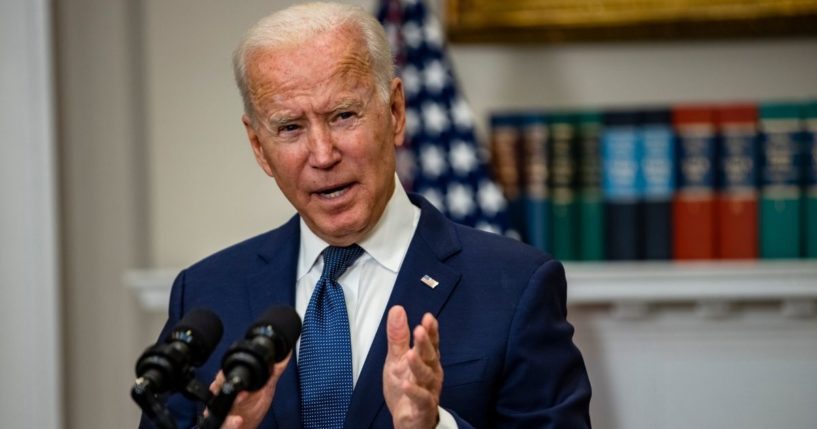
Biden Green-Lights States to Redirect COVID Funds to Extend Enhanced Jobless Benefits Past September Deadline
Treasury Secretary Janet Yellen and Labor Secretary Marty Walsh announced Thursday that President Joe Biden is authorizing states to use COVID-19 relief funds to extend enhanced federal unemployment benefits past the Sept. 6 deadline.
The $300 per week bonus was first enacted in the CARES Act in the spring of 2020 in response to the pandemic economic shutdown and was extended again in December until March of this year.
In March, Democrats in Congress passed the American Rescue Plan Act, which extended the bonus until Labor Day.
In a Thursday letter, Yellen and Walsh informed Chairman of the Senate Finance Committee Ron Wyden and Chairman of the House Ways and Means Committee Richard Neal that Biden would not be supporting legislation extending the enhanced benefits further. However, it pointed them to the COVID funds as an alternative.
“As President Biden has said, the boost was always intended to be temporary and it is appropriate for that benefit boost to expire,” they wrote.
The department heads noted job growth averaged 832,000 jobs per month over the last three months and the unemployment rate dropped to 5.4 percent in July.
Think Fed Unemployment Benefits Going Away?
Think AgainTreasury Department is re-affirming that states can use their allocations of the $350 billion in American Rescue Plan State and Local Fiscal Relief Funds to provide assistance to unemployed workers.https://t.co/GEavbcsjmr
— Charles V Payne (@cvpayne) August 19, 2021
That said, the administration is authorizing states to redirect COVID relief funds passed in the American Rescue Plan to keep the $300 federal bonus in place.
“The American Rescue Plan allocated $350 billion to state and local governments to support communities’ continuing response to the pandemic, address its economic impacts, and lay the groundwork for a strong and equitable recovery,” Yellen and Walsh explained.
“Now, in states where a more gradual wind down of income support for unemployed workers makes sense based on local economic conditions, American Rescue Plan funds can be activated to cover the cost of providing assistance to unemployed workers beyond September 6th,” they continued.
CNBC reported 26 states opted out of the enhanced unemployment benefits, with governors in those states arguing the $300 per week bonus was making it harder for employers to fill positions and spur economic recovery.
There are currently more than 10 million open positions nationwide, according to the Bureau of Labor Statistics.
A report released by the Foundation for Government Accountability last month concluded the enhanced unemployment benefits are keeping people on the sidelines by comparing 26 states that stopped them to those that did not.
“States that ended the unemployment bonus saw significantly faster growth,” the FGA said.
“In fact, in states that ended the federal pandemic-related unemployment programs, work search activity rose by more than 28 percent in May and June. This growth was 68 percent faster in states that ended the unemployment bonus than in states that did not.”
Unemployment declined in the states that opted out of the enhanced benefits.
It’s a real mystery why so many businesses can’t find workers [image via @larry_kudlow] pic.twitter.com/rYJxTKVmix
— Tom Elliott (@tomselliott) August 3, 2021
“Since May 8, new unemployment claims have fallen by 30 percent in states that ended the bonus, hitting their lowest levels since the pandemic hit,” the organization said.
Meanwhile, in the states that kept paying the enhanced benefits, unemployment claims ticked up in five of the last six weeks before the report came out on July 22.
“Since June 5, the number of new people filing for unemployment has risen by more than 16 percent in states keeping the unemployment bonus,” the FGA said.
The organization also noted in a news release in early July that there was a “4.9 percent increase in claims that states continuing unemployment bonuses experienced,” while states that “ended unemployment bonuses saw a 3.2 percent decrease in initial unemployment claims.”
Both Biden and Federal Reserve Chairman Jerome Powell acknowledged in July that the enhanced benefits are keeping people out of the workforce.
Biden initially said during a CNN town hall that he saw no evidence that the additional benefits had a “serious impact” on hiring.
However, he added, “We’re ending all those things that are the things keeping people back from going back to work,” The New York Times reported.
Powell said, according to the Times, that COVID-19 fears may be part of the reason Americans aren’t going back to work. But he went on to say, “There’s also been very generous unemployment benefits, which are now rolling off. They’ll be fully rolled off in a couple of months.”
So for now there will be no additional congressional authorization, but the $300 bonus can continue, according to Biden.
In 2019, House Speaker Nancy Pelosi and fellow Democrats sued then-President Donald Trump for redirecting Department of Defense funds to continue building a wall on the U.S.-Mexican border.
“The administration’s actions here demonstrate a shocking disregard for the Appropriations Clause, which protects Congress’s ‘exclusive power over the federal purse,’” the House said in its lawsuit.
This article appeared originally on Patriot Project.
Truth and Accuracy
We are committed to truth and accuracy in all of our journalism. Read our editorial standards.
Advertise with The Western Journal and reach millions of highly engaged readers, while supporting our work. Advertise Today.












